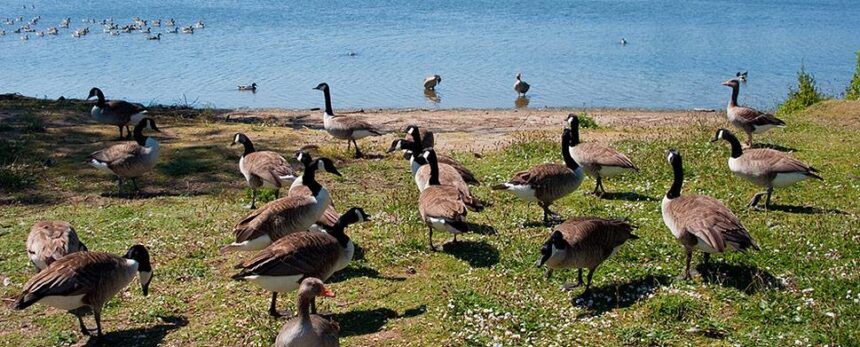Title: ‘No More!’: Foster City Takes Action Against Growing Geese Problem
FOSTER CITY, CA – As the serene waters of the Lagoon reflect the vibrant hues of nature, a persistent problem has begun to overshadow the beauty of this thriving community. Residents of Foster City are raising their voices in frustration over an escalating population of Canada geese that have turned the picturesque landscape into a challenge for both property owners and public spaces. In response, local officials are taking significant steps to address the issue, implementing new strategies aimed at curbing the avian invasion that has left sidewalks littered and parks less inviting. With the summer migration season approaching, city leaders are urging swift action to restore the balance between nature and urban living in hopes of reclaiming the city’s charm.
Foster City Implements Measures to Curb Increasing Goose Population
In response to the mounting concerns regarding the burgeoning population of geese in Foster City, local authorities have unveiled a series of decisive measures aimed at managing the issue effectively. Residents have voiced frustrations over the increasing number of geese that have made local parks and waterfronts their home, leading to a variety of challenges, including littering, noise disturbances, and potential health concerns. To address these problems, city officials are implementing several strategies that include:
- Public Education Campaigns: Informing residents about feeding restrictions and the ecological impacts of human intervention on wildlife.
- Habitat Modifications: Working to alter environments that attract geese, such as reducing grassy areas near water bodies.
- Egg Oiling Programs: Introducing humane practices aimed at curbing the reproductive rates of the geese population.
- Professional Wildlife Management: Collaborating with experts to develop a long-term management plan for sustainable coexistence.
City officials have emphasized that these measures are designed not only to control the goose population but also to ensure the well-being of the community and the natural landscape. A recent study outlined in a report revealed that unchecked goose populations can lead to a decline in local biodiversity and increased maintenance costs in public areas. To transparently share progress with residents, Foster City has committed to regular updates, including the following anticipated milestones:
| Milestone | Expected Completion |
|---|---|
| Launch of Public Education Campaign | March 2024 |
| First Evaluation of Habitat Modifications | June 2024 |
| Implementation of Egg Oiling Program | April 2024 |
| Wildlife Management Plan Review | December 2024 |
Expert Insights on the Environmental Impact of Geese in Urban Areas
The growing population of geese in urban settings has sparked significant scrutiny, particularly in regions like Foster City. As city officials and environmental experts weigh the pros and cons of coexistence with these birds, it has become clear that their impact on local ecosystems is multifaceted. While geese can evoke fond memories of serene parks and recreational spaces, their high population density can lead to environmental degradation. Experts highlight several areas of concern, including:
- Water Quality Degradation: Excessive droppings contribute to nutrient pollution, resulting in algal blooms that can harm aquatic life.
- Public Health Risks: Higher concentrations of bacteria and parasites associated with droppings can pose health risks to humans, especially in parks and near water bodies.
- Biodiversity Loss: Geese competition with native species for resources can disrupt local ecosystems, leading to declines in biodiversity.
In response to the increasing challenges posed by geese, Foster City has initiated several strategic measures aimed at managing their presence while minimizing environmental harm. Collaborative efforts with wildlife experts and environmental agencies have brought about a range of solutions, some of which include:
| Action Plan | Description | Expected Outcome |
|---|---|---|
| Habitat Modification | Altering park landscapes to make them less attractive to geese. | Reduced nesting and grazing opportunities. |
| Community Education | Informing residents about the impacts of feeding geese. | Increased awareness leading to decreased food dependency. |
| Population Control | Implementing humane culling or relocation programs. | Balanced population and enhanced ecosystem health. |
These initiatives underline a growing recognition that addressing the presence of geese in urban areas is not merely an aesthetic issue but a critical component of maintaining healthy ecosystems. As the city moves forward, it aims to foster collaborative relationships with environmental advocates to ensure sustainable solutions that respect both wildlife and community wellness.
Community Strategies for Effective Goose Management and Prevention
In response to the growing population of Canada geese in Foster City, community leaders are exploring a variety of innovative strategies to manage and prevent further encroachment. Residents have voiced concerns over the mess created by large flocks congregating in local parks and pathways, prompting city officials to prioritize both humane and effective solutions. Key strategies under consideration include:
- Habitat Modification: Reducing open grassy areas where geese prefer to nest by planting native shrubs and flowers that are less hospitable to them.
- Community Education: Raising awareness through workshops and informational campaigns about the impact of feeding geese, encouraging residents to refrain from this practice.
- Trained Detail Teams: Employing specialists to identify and manage goose populations through methods that comply with wildlife protection laws.
- Collaborative Programs: Partnering with local wildlife organizations to monitor and understand the migration patterns and population dynamics of the geese.
To support these initiatives, Foster City has also proposed the establishment of a dedicated task force aimed at assessing the effectiveness of implemented strategies. The task force will regularly collect data on local goose populations and maintain a feedback loop with residents to adapt management efforts as needed. This forward-thinking approach will not only tackle the immediate concerns but also foster a sustainable relationship between the community and its wildlife, creating an environment where people and nature can coexist harmoniously.
In Retrospect
In conclusion, the escalating goose population in Foster City has prompted local officials to take decisive action in addressing the challenges posed by these birds. With increasing reports of environmental degradation and public safety concerns, city leaders are committed to implementing strategies that balance wildlife management with community needs. As Foster City navigates this pressing issue, residents are encouraged to stay informed and engaged in the ongoing discussions about sustainable solutions. The collective effort to reclaim the city’s parks and waterways from an overabundance of geese marks a significant step toward preserving the quality of life in the community. Moving forward, the city will continue to monitor the situation closely, seeking feedback from residents and experts alike as they strive for an effective resolution.









